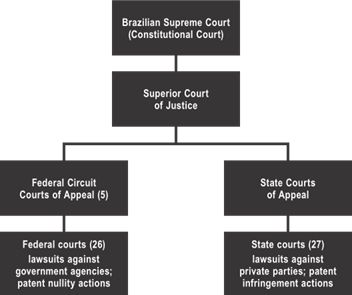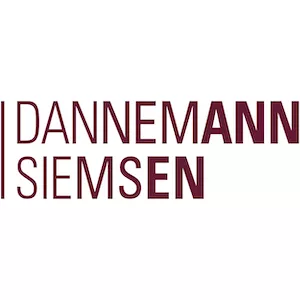- The Industrial Property Law (Federal Law 9.279 of 14 May 1996); and
- The Civil Procedure Law (Federal Law 13.105 of 16 March 2015).
Brazil is a signatory to:
- the Agreement on Trade-Related Aspects of Intellectual Property Rights;
- the Patent Cooperation Treaty; and
- the Paris Union Convention.
Brazil has a bifurcated system, in which:
- infringement actions are filed before state courts; and
- invalidity actions are filed before the federal courts.
Article 57 of the Industrial Property Law provides that: “A patent nullity action will be filed in the forum of the Federal Court and the Brazilian Patent and Trademark Office, when it is not the plaintiff, will intervene in the action.”
Brazil has a bifurcated system, in which:
- infringement actions are filed before state courts; and
- invalidity actions are filed before the federal courts.
There are 26 states and a federal district (the capital, Brasília), and each state has its own court.
Court structure

Brazil has no jury trials for patent litigation; every case is decided by a bench trial. The first instance is always decided by one judge, while on appeal a panel of judges usually decides the case.
Yes. The venue in federal court for nullity actions is determined by:
- the domicile of the Brazilian Patent and Trademark Office; or
- the domicile of the patent owner.
Most court actions are filed in the Federal Court of Rio de Janeiro, which has special chambers that specialise in intellectual property; but cases are also filed in the Federal Courts of São Paulo and Brasilia.
Infringement actions can be filed before the courts of any of the 26 states and at the Brasília District Court. The general rule is to file in the place where either:
- the infringer has its domicile; or
- the infringement is taking place. This criterion opens up abundant opportunities for forum shopping, given that there are 26 states and a federal district.
The Rio de Janeiro State Court is usually preferred by patent owners, since it is more likely to grant preliminary injunction requests.
Both patent owners and licensees may file for patent infringement in Brazil. The only restriction for licensees is provided for in Article 62 of the Industrial Property Law, as follows: “The licence contract must be registered with the Patent Office so that it can produce effects in relation to third parties.”
Yes.
Yes, the Civil Procedure Code provides for so-called ‘passive co-participation’, which allows more than one defendant to be included in a lawsuit.
For co-participation to take place, there must be:
- communion of rights or obligations regarding the dispute;
- connection by the request or by the cause of action; or
- affinity of issues by common points of fact or law.
Yes. The only requirement is that the third party prove that it has a legitimate interest in the result of the declaration.
A declaratory judgment action can be filed at a regular state court to seek a declaration of non-infringement. This usually happens when a potential infringer receives a cease-and-desist letter and has sufficient evidence of lack of infringement. In this scenario, the same judge will decide both the declaratory judgment action and any possible future infringement action. The jurisdiction is the regular state court either:
- at the place where the alleged infringement took place; or
- at the domicile of the defendant.
Literal infringement: The extension of the protection conferred by a patent will be determined by the content of the claims, interpreted in the light of the specification and drawings. Literal infringement occurs when a product incorporates all elements of a claim. Literal patent infringement occurs in the following situations:
- A patented product is manufactured without the authorisation of the patent owner;
- A patented process is used without the authorisation of the patent owner;
- A product manufactured in violation of a patent is exported, sold, exhibited, offered for sale, maintained, concealed or received with a view to its use for commercial purposes;
- A patented product is imported without the patent owner’s consent for the purposes mentioned above, provided that the product was not placed on the market by the patent owner or with its consent; or
- A component of a patented invention is supplied, provided that the final application of this component necessarily leads to the exploitation of the subject matter of the patent.
Joint infringement: There can be literal infringement by joint tortfeasors in Brazil. For instance, joint tortfeasance occurs when one infringer imports, another stocks and a third commercialises the infringing goods. Each of the three is liable for literal infringement and each can be prosecuted in a single litigation.
Brazilian patent law defines as a crime the act of supplying a component of a patented product, or material or equipment for carrying out a patented process, provided that the final application of the component, material or equipment necessarily leads to the exploitation of the subject matter of the patent.
Contributory infringement is also expressly authorised in Brazilian law.
Infringement under the doctrine of equivalents: In Brazil, infringement by equivalents is expressly provided for in the Industrial Property Law, as follows: “The criminal offences of this Chapter are committed even if the violation does not affect all the claims of the patent or if it is restricted to the use of means equivalent to the subject matter of the patent.”
The patent owner generally has the burden of proving literal infringement by comparing the elements of the infringing article to the patent claim elements. In the case of process claims, the burden of proof is reversed—in other words, the patent will be deemed to be infringed when the holder or owner of a product fails to prove, through a specific judicial ruling, that it was obtained through a different manufacturing process from that protected by the patent.
The scope of protection conferred by a patent will be determined by the content of the claims, interpreted in the light of the specification and drawings.
An application for a patent of invention must refer to a single invention or to a group of inventions so interrelated as to make up a single inventive concept. An application for a utility model must refer to a single principal model that may include a plurality of distinct additional elements or structural or configurative variations, provided that the technical-functional and corporeal unity of the object is maintained.
The claims must be based on the specification, characterising the particularities of the application and defining clearly and precisely the subject matter to be protected.
To demonstrate non-literal infringement in Brazil, it is necessary to prove that the means or process used by the alleged infringer is equivalent to the patented subject matter. In principle, it is not necessary to compare each element or step defined in the claim with the respective element or step in the infringing device or method, but rather only the whole invention with the infringing product or process. In other words, even if a specific feature defined in a claim is totally omitted from an infringing product, if that product can still be regarded as the overall equivalent of the patented product, equivalence may be argued. Nevertheless, many practitioners consider that equivalence should be preferably established on an element-by-element basis rather than through an overall comparison.
The Brazilian courts apply this concept in a broad way. In a few decisions, the courts have expressly indicated the criteria applied to conclude in favour of non-literal infringement.
In general, the Brazilian courts adopt a pro-patent owner position when there are ‘insubstantial differences’ between the claimed invention and the infringing device or process. In these cases, the courts have found patent infringement on the merits of the case in a final ruling.
One possible restriction to the application of the concept of infringement by equivalence relies on the prosecution history of the case. Although the Industrial Property Law contains no specific provisions relating to prosecution history estoppel, it is interesting to note that this has been applied in practice. In fact, the courts have applied a general legal concept called ‘venire contra factum proprium’, which provides that parties cannot take contradictory courses either during prosecution at the Brazilian Patent and Trademark Office (BPTO) or before the courts. Therefore, patent owners cannot make certain arguments to have their patent granted and thereafter enforce their rights using opposing arguments.
Hence, before starting patent litigation, it is very important to review the prosecution history of the patent and carefully analyse the potential infringing product to check for possible inconsistencies that might jeopardise the case.
Yes (see question 4.1).
No.
In patent infringement cases, the judge can grant an ex parte restraining order to prevent future violations. In this situation, the defendant will not be permitted to sell the infringing goods while the civil action is pending, under the threat of a daily fine to be determined by the court. The judge may grant this injunction in a proceeding with both parties present and may request the plaintiff to post a bond to guarantee execution of the injunction. Courts usually request this bond in infringement cases, which is relatively nominal.
Before granting preliminary orders either for collecting evidence or for restraining the defendant, the court must ensure that the following criteria are satisfied:
- The plaintiff has demonstrated that:
-
- there is a likelihood of success;
- it has the right to protection; and
- the defendant is infringing the patent (an expert report confirming patent infringement can be a very powerful piece of evidence); and
- The plaintiff’s rights are being threatened by an activity of the defendant and could be severely damaged if no action is taken before a final decision on the merits is rendered.
In civil law, a patent owner can request a preliminary injunction at any time, even before the defendant has learned of the action. The judge may even grant a preliminary injunction without hearing the defendant if he or she considers that serving the defendant with a summons would put the integrity of the evidence at risk.
Five years, according to Article 174 of the Industrial Property Law.
No. All patents are published in the Official Gazette of the Brazilian Patent and Trademark Office, which makes this public information.
Ideally, the plaintiff must include all necessary evidence in its initial complaint. However, until the end of the evidentiary phase, new evidence may be produced. An expert appraisal is the most important type of evidence in patent infringement cases.
Yes (see question 5.1).
The judge may request the plaintiff to post a bond to guarantee execution of an injunction. However, the defendant can request the substitution of the injunction by a guaranty, which may be accepted at the judge’s discretion.
There is no disclosure in Brazil.
There is no disclosure in Brazil.
There is no disclosure in Brazil.
The production of evidence is not confined to a single ‘discovery-like’ phase at first instance. Documentary evidence should be produced by the parties in the pleading phase. The plaintiff presents its evidence in the complaint and the defendant presents its own evidence in its response. A judge may consider either party’s request for oral testimony at any time or
The following types of evidence may be produced during the action:
- personal depositions of the parties;
- statements of witnesses;
- documentary evidence;
- sworn written evidence;
- evidence from experts; and
- judicial inspection.
Facts from third parties can be introduced only:
- during witness testimony (deposition or examination); or
- by an order for the production of a document that the judge considers necessary to clarify the case.
In patent litigation, a party may submit documentary evidence together with the complaint; but in view of the technical difficulties involved in such disputes, judges tend to appoint a court expert. The judge will appoint an independent technical expert; or the parties may choose by mutual agreement an expert to review the possible patent infringement issue and draft a report. The Civil Procedural Code permits the parties to establish a schedule for the expert examination procedure – for instance, determining several meetings before a final report is issued. However, this does not happen frequently.
The person appointed must:
- be a specialist in his or her field; and
- prepare a statement attesting to his or her competence to answer the technical questions raised by the parties.
Both parties can appoint their own expert assistants, who will confirm or oppose the official expert’s opinion.
The court may ask its expert and the parties’ experts to appear during the hearings to provide further clarification to the court. Judges can also request any other evidence that they consider relevant to the case.
There are no statutory standards of proof.
The plaintiff generally has the burden of proof, except in infringement actions involving process claims, where the burden of proof is reversed – in other words, the patent will be deemed to be infringed if the holder or owner of a product fails to prove, through a specific judicial ruling, that it was obtained through a different manufacturing process from that protected by the patent.
No, there is no procedure for claim construction.
There is no procedure for claim construction.
There is no procedure for claim construction.
Not in patent infringement cases; however, partial nullity is a possibility in cancellation actions.
Non-infringement and invalidity: Because novelty and inventive step are legal requirements for a patent to be valid in Brazil, if the accused product or method can be taken to be fully embraced by the prior art or to be inferred therefrom in an obvious manner, this finding alone will preclude infringement because the patent will be invalid. The invalidity of a patent is expressly provided for in the law as a matter of defence in the course of an infringement action. If the invalidity defence succeeds in an infringement action, the decision has legal effect only between the parties.
Aside from arguing the nullity of the patent as a matter of defence in the course of an infringement action, an accused party may also file an invalidity lawsuit before a federal court requesting nullity of the patent, with the Brazilian Patent and Trademark Office as a co-defendant. If there is sufficient evidence of the invalidity of the patent in the nullity action, an injunction may be granted whereby the effects of the patent are suspended until a final decision on the merits has been issued. In this scenario, the infringement action will probably be stayed until the federal court has decided on the merits of the nullity action. However, the infringement action judge has complete discretion about whether to stay that action pending the federal court’s decision.
Brazilian law expressly provides for the following exceptions to the rights conferred by a patent:
- acts done privately and without commercial ends;
- acts for experimental purposes relating to studies or to scientific or technological research;
- the preparation of a medicine according to a medical prescription for individual cases; and
- acts of use after the domestic exhaustion of rights.
These exceptions include the principle of national exhaustion of rights. However, a patent owner will still be entitled to prevent third parties from the parallel importation of patented products.
Other statutory defences include the following.
Unenforceable due to inequitable conduct: Although there is no defence termed ‘inequitable conduct’ in Brazil, there is by law a duty of good faith and a patent can be invalidated if the applicant did not act in good faith during the prosecution of the patent application. This lack of good faith could be found in similar actions to those which constitute the basis for prosecution history estoppel: a party cannot make one argument to have its patent granted and then enforce its rights with opposing arguments. This is determined on a case-by-case basis – for example, where a party has not presented a document of which it had knowledge that would have precluded grant of the patent. No direct proof of intent to deceive is needed.
Compulsory licence: In Brazil, there is a specific possibility that compulsory licences to third parties will be ordered on request. A compulsory licence may be granted on the following grounds:
- a decision from an administrative or court proceeding concluding that there was an abuse of patent rights;
- non-exploitation of the subject matter of the patent in Brazil due to failure to manufacture or incomplete manufacture of the product, or due to lack of full use of a patented process, except where this is due to economic unviability, in which case importation will be admitted (after three years from grant of the patent); or
- commercialisation that does not meet the needs of the market (after three years from grant of the patent).
A compulsory licence will not be granted if, at the date of the request, the patent owner:
- justifies non-use for legitimate reasons;
- proves that serious and effective preparations for exploitation were carried out; or
- justifies a failure to manufacture or commercialise the patented products due to legal obstacles.
In cases of national emergency or public interest, declared through an act of the federal executive authorities, insofar as a patent owner or its licensee does not meet such necessity, a temporary ex officio non-exclusive compulsory licence may be granted, without prejudice to the rights of the patent owner.
Laches: There is no formal concept of laches in Brazilian law; but a patent owner may jeopardise its chance of obtaining a preliminary injunction to stop the infringement based on a concept similar to laches applied in the judge’s analysis of the conditions for granting the requested injunction.
Equitable estoppel: Brazilian law has a concept similar to that of ‘equitable estoppel’ in the United States. There is a general principle of good faith that can theoretically be used to justify such a defence if:
- the patent owner misled the infringer into inferring that the patent owner did not intend to enforce its patent;
- the alleged infringer reasonably relied on this misleading conduct; and
- the infringer would suffer damages if the patent owner were allowed to proceed with its claim.
Yes (see question 9.1). However, although this is statutory as per the Industrial Property Law, there are legal precedents from the Superior Court of Justice indicating that the competent court to decide on patent validity is exclusively the Federal Court. There has been no firm interpretation of this matter in Brazil thus far and an argument can be made either way.
Only as a result of a non-infringement declaratory judgment action.
The judge may require the parties to participate in settlement discussions, but the parties may refuse.
Yes, if both parties request it.
If the parties ask the judge to ratify a settlement agreement, the judge may request to see it. However, the parties may decide not to disclose the full terms of their settlement agreement, since judicial proceedings are usually public.
They are public, in general; but the parties may request that the proceedings be held in camera, meaning that only the parties and the judge will have access to the dockets.
In an infringement action, in the state court, the main steps are as follows:
- the initial brief;
- analysis of any request for a preliminary injunction and interlocutory appeals against a decision to grant or deny such relief;
- the defendant’s response;
- the plaintiff’s reply to the defendant’s response;
- decisions organising the case (eg, evaluation of preliminary issues, determination of the evidence that will be produced, appointment of a court expert to conduct a technical appraisal);
- presentation of the expert’s report;
- the parties’ response to the expert’s report;
- presentation of a complementary expert’s report;
- the ruling on the merits;
- appeal;
- the judgment on appeal; and
- possible appeal to the Superior Court of Justice.
Normally, the validity of the patent is dealt with in a separate lawsuit at the Federal Court, with the participation of the Brazilian Patent and Trademark Office (BPTO). However, this does not exclude the possibility of the state court incidentally analysing the validity issue. That said, recent decisions of the Superior Court of Justice seem to have ruled out this possibility of incidental analysis in infringement actions, since the BPTO’s participation is required.
In a nullity action in the Federal Court, the main steps are as follows:
- the initial brief;
- analysis of any request for a preliminary injunction and appeals against a decision to grant or deny such relief;
- the responses of the defendant and the BPTO;
- the plaintiff’s reply to the responses of the defendant and the BPTO;
- decisions organising the case (eg, evaluation of preliminary issues, determination of the evidence that will be produced, appointment of a court expert to conduct a technical appraisal);
- presentation of the expert’s report;
- the parties’ response to the expert’s report;
- presentation of a complementary expert’s report;
- the ruling on the merits;
- appeal;
- the judgment on appeal; and
- possible appeal to the Superior Court of Justice
Both infringement and validity proceedings typically take at least two years.
They may have some influence, but this is at the judge’s discretion. The BPTO is more likely to rely on the decisions of foreign bodies.
The criminal remedies available are as follows:
- search and seizure;
- criminal complaint;
- arrest and possible imprisonment of infringers; and
- costs.
The civil remedies available are as follows:
- search and seizure;
- injunction;
- damages;
- destruction of seized products; and
- costs.
There are no punitive or enhanced damages in Brazil.
A judge will determine the amount of damages to be paid to the injured party according to whichever of the following criteria is most favourable to the plaintiff:
- the benefits that would have been gained by the injured party had the violation not occurred;
- the benefits gained by the infringer; or
- licensing royalties.
In addition to losses and damages concerning infringement occurring after grant of the patent, the patent owner is entitled to compensation concerning the period of infringement between publication of the respective application and grant. However, if the infringer obtained knowledge of the contents of the application prior to its publication – for example, by means of a warning letter – the period of unauthorised exploitation, for the purposes of compensation, will begin to run from the date of commencement of exploitation.
A first instance court decision can be appealed to the correspondent Court of Appeals. Such appeal has a de novo effect. This appeal will be reviewed and decided by a Panel of Justices. After the decision from the Court of Appeals, there are still two possible appeals: (i) a special appeal to the Superior Court of Justice, if the decision has a violation or a misinterpretation of a Federal Law; and/or (ii) an extraordinary appeal to the Supreme Court, if the decision has a violation of a Constitutional Rule.
The average time for an appeal is two years, depending on the court. The average time to obtain a decision from the Superior Court of Justice is three to five years.
The Civil Procedure Law provides that it is the parties’ duty to bear the costs of the acts they perform or request in the proceedings, paying these in advance from the outset until the final judgment or, in execution, until full satisfaction of the right recognised in the instrument.
The losing party will be ordered to pay the winning party the costs it has advanced.
No.
There is no rule that prohibits third-party litigation funding in Brazil. The country has no statutes or regulations dealing specifically with this.
Patent term: There was a major development in Brazil recently due to a decision issued by the Supreme Court. Article 40 of the Industrial Property Law used to read as follows:
Patent Term
Article 40 - A Patent of invention will have a term of 20 (twenty) years and a utility model patent a term of 15 (fifteen) years, counted from the filing date.
Sole Paragraph - The term will not be less than 10 (ten) years for patents of invention and 7 (seven) years for utility model patents, counted from grant, except when the Brazilian Patent and Trademark Office is prevented from proceeding with the examination as to the merit of the application, due to a proven pendente lite or for reasons of “force majeure”.
However, the sole paragraph above was challenged on the basis of unconstitutionality and in May 2021 the Supreme Court declared this paragraph unconstitutional. The court ruled that:
- the proper term of a patent should be 20 years from the date of filing, as set forth by the Industrial Property Law; and
- the minimum duration of 10 years from grant creates uncertainty, as competitors cannot ascertain the exact date on which a patent will lapse.
The Supreme Court decided that all patents already granted with the additional term should be preserved and remain valid and in force, with two exceptions:
- patents whose terms have already been challenged through lawsuits filed before 7 April 2021; and
- patents granted with a term of 10 years for pharmaceutical products and processes and health-related products and materials, such as medical devices.
For those patents, the term was reduced to 20 years from the date of filing of the respective applications.
Unlike in other countries, the Brazilian regime has no specific provisions relating to patent term adjustments/extensions due to the Brazilian Patent and Trademark Office’s (BPTO) possible or unreasonable delay. However, since this decision was issued, over 50 lawsuits pursuing term adjustments of Brazilian patents have been filed. None has been granted as yet, as the first requests were filed only in the third quarter of 2021. This will probably happen within the next 12 months.
Proposed amendments: On 14 July 2022, Bill 2,056/2022 was proposed by House Representative Alexis Fonteyne, aimed at revising:
- Law 5,648/1970, which created the BPTO; and
- the Industrial Property Law.
The main proposals are as follows:
- The bill would allow patent owners to request compensation for the term of protection if the BPTO, in the prosecution of patents, misses the deadlines set out in the general Law on Administrative Proceedings. This compensation would be limited to a maximum of five years. This type of patent term adjustment would be a complete novelty in the Brazilian patent system.
- Third-party observations may be submitted between publication of the application and the end of examination. Based on BPTO’s interpretation “the end of examination” does not include a possible administrative appeal. Under the bill:
-
- the timeframe for presenting such observations would be extended until the very end of the examination, including appeals; and
- it would be possible to file a divisional applications for up to 60 days after publication of an allowance or a final rejection decision (Articles 26 and 37). Under the current interpretation of the BPTO, a divisional can only be filed until the allowance of the final rejection decision.
The next step expected in relation to the bill is the establishment of a committee to evaluate it.
Brazil has come under the spotlight in recent years because preliminary injunctions are frequently granted in patent infringement cases. The Rio de Janeiro State Court has become a preferred venue for litigation involving the infringement of standard-essential patents, putting Brazil on the map for global disputes.
As a result, defendants in particular should be very aware of this.





